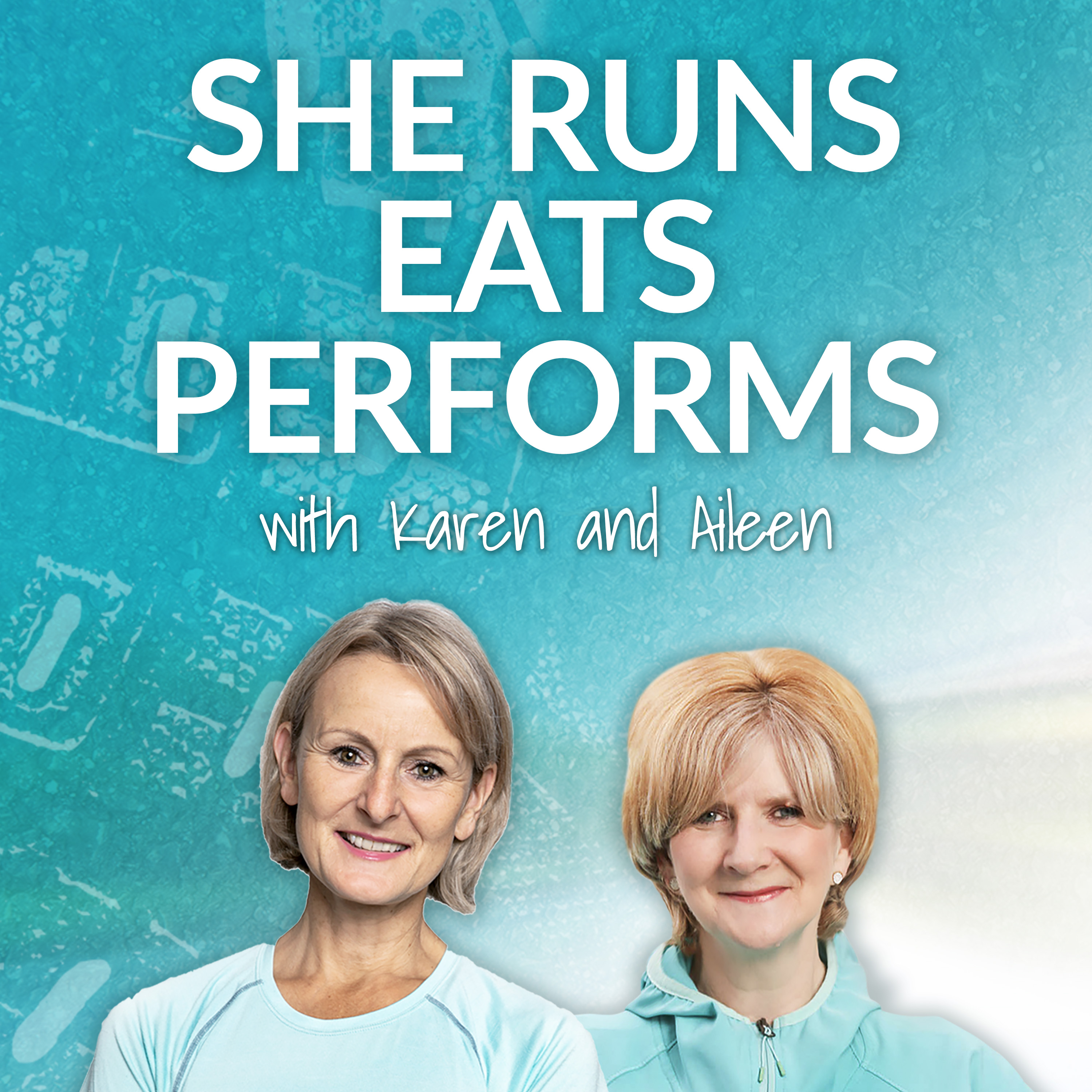Nutrition for Strength Training
Nutrition for Strength Training
Gone are the days when runners just go out and run…. most runners tend to include many different training approaches
BUT…do you consider what to eat for the different styles of training you do?
There is a lot to cover so in this episode we talk about WHAT and WHEN and HOW MUCH to eat for your STRENGTH TRAINING days. We:
- Give an overview of strength training and how it is thought to support running
- Focus on some food and nutrition recommendations to support strength training
- Discuss how to put the recommendations into practice for YOUR training
SHOW NOTES
(06:13)
Outlining various ways in which strength training is thought to support running performance including:
- Running Economy - the amount of oxygen (O2) the body uses to maintain a certain pace
- Sprint speed
- Lean muscle mass
- Power
Also, DID YOU KNOW…..
Heavy resistance training (HRT) and plyometric training (PLY) are the most common strength training methods used by distance runners apparently…..Plyometrics being the jumping action during exercise for example jump squats.
(10:37)
Discussing the TWO key macronutrients known to support strength training. Namely:
- Carbohydrates
- Protein
Concentrating on Carbohydrate and its influence on strength training including:
- Maintaining training performance
- Helping recovery post-training
- Facilitating glycogen replenishment for future training sessions
NOTE: It is recommended that when completing strength training no more than 4g/Kg/Body Weight per day (BW/d) should be consumed to help optimise training performance and adaptations.
BUT…it is still important to ensure adequate energy intake overall. REMEMBER…if/when in energy deficit the body will breakdown muscle to use the protein for energy production!! So any strength training efforts could be in vain!!
(13:58)
Concentrating on Protein and its influence on strength training including:
- Increasing muscle mass (hypertrophy)
- Limiting risk of muscle injury
- Muscle repair
- Muscle remodelling
NOTE: An intake of between 1.6 g/kg/BW/d and 2.2g/Kg/BW/d of protein is required to maximise fat-free mass gains when completing strength/resistance training in bodybuilders/weightlifters.
BUT….runners would not be aiming for the upper level as this could potentially lead to increased hypertrophy (or muscle bulking), which is NOT the desired outcome!! Lean muscle mass is generally the aim of strength training for runners.
We believe that between 1.6g-2g/Kg/BW/d of protein would be suffice for most runners completing strength training.
REMEMBER… the even spread of protein servings over the course of the day is recommended to maximise Muscle Protein Synthesis (MPS) over a 24hr period aiming for approximately 20g of protein per serving.
(18:47)
FEMALE FACTORS
- It is recommended that midlife females should consume approx. 1.6g/Kg/BW/d of protein to help MAINTAIN muscle mass because we lose muscle at quite a significant rate as we age. Preserving muscle mass can help slow this process…although it cannot stop it!!
- Some studies have observed that females focusing on physique-oriented sports (for example body building/weight lifting) consume between 160-415 g/day (2.8-7.5 g/kg) of CHO compared to their male counterparts who consume between 243-637 g/day (3-7.2 g/kg). So, at the lower end, where energy restriction may be observed/the aim - females consume LESS carbohydrate (CHO), however at the upper end where hypertrophy is potentially the desired outcome - females consume MORE CHO than their male counterparts. This is possibly because it is genetically easier for males to “bulk up” than females.
(24:19)
Carbohydrate for strength training
Studies have shown that only 24% – 40% of muscle glycogen is depleted during a standard session of resistance training so, although carbohydrate intake is important for strength training, a HIGH intake of CHO on a gym day is not essential!!
BUT…when in a state of low energy availability, for example following an overnight fast, there is evidence that insufficient carbohydrate intake could impair performance during strength training.
So, if you go to the gym first thing in the morning then having a CHO rich snack or light breakfast beforehand may benefit training.
Food ideas to consider pre-training include:
- A banana
- A small amount of overnight oats or porridge made with oat milk or another milk alternative
- A couple of dry oatcakes…or maybe you could mash some banana on top
- An apple or pear
NOTE: It is NOT essential to have a carbohydrate snack immediately after training BUT…ensure adequate amounts of CHO (approx. 3-4g/Kg/BW/d) is consumed throughout the day
Carbohydrate choices to include:
- Wholegrains e.g. brown rice, quinoa, whole grain couscous, millet, amaranth
- Legumes e.g. lentils, beans, pulses
- Root vegetables e.g. sweet potato, beetroot, squash, swede, parsnips, carrots
(32:08)
Protein for Strength Training
Guidelines suggest having approximately 1.6g/Kg/BW/d of protein but with each serving containing no more than 20g of protein split into approximately 5-6 portions throughout the day. This could be:
- A portion with each meal = 3
- 2-3 protein snacks throughout the day and evening
NOTE: It is recommended that one of the protein servings to be consumed immediately after a strength training session because MPS is enhanced when protein consumed within the first 30 minutes post strength training.
This could be a good time to have a protein shake because it is:
- Portable
- Easy to consume
- Easy to digest and absorb
- Contains an appropriate amount of protein per serving
Something to consider!
REMEMBER to choose protein foods containing the Branched Chain Amino Acids (BCAAs), especially Leucine, which is known to be the master trigger of the muscle building cascade.
Protein foods containing BCAAs include:
- Meat, poultry, and fish
- Eggs
- Dairy products, such as milk and cheese
- Nuts and seeds
- Soy products, such as tofu and tempeh
- Legumes, including beans, peas, and lentils
(37:36)
ACTION POINT to consider putting into place:
An easy one is to ensure that you have a carbohydrate snack BEFORE you do any strength training…and be CONSISTENT in this.
As runners it is easy to forget (or maybe not bother!) because you are used to getting up and running in the fasted state.
BUT this is not beneficial for strength training. So, remember to have that banana or whatever food choice best suits YOU!
(38:36)
KEY TAKEAWAYS
1) Strength training could support your overall running performance in several ways including:
- Improving running Economy
- Improving sprint speed
- Improving lean muscle mass
2) Both Carbohydrate AND Protein are important for supporting strength training:
- Carbohydrate for maintaining performance and energy recovery following a training session
- Protein for Muscle Protein Synthesis, muscle repair, remodelling etc
3) The recommended daily intake of CHO when completing strength training is no more than 4g/Kg/BW per day
4) The recommended daily intake of Protein when completing strength training (to build lean mass) is approx. 1.6g/Kg/BW/d
5) Remember to spread your protein and CHO intake throughout the day, ensuring you include complex carbohydrate food sources and approx. 20g protein per serving. Aim for 5-6 servings of protein throughout the day.
6) If completing your strength training first thing in the morning - have a quick release carbohydrate snack before you train to help maintain performance throughout your training.
Related Topics:
Protein Powders: Do Runners Need Them?
Muscle Mass to Power Your Running Performance
Stamina for Running Performance
Disclaimer:
The suggestions we make during this episode are for guidance and
advice only, and are not a substitute for medical advice or treatment.
If you have any concerns regarding your health, please contact
your healthcare professional for advice as soon as possible.
Aileen Smith and Karen Campbell host RUNNERS HEALTH HUB. A place for like-minded female runners who are looking for simple ways to support running performance, energy, endurance, and general great health.
if this is your first time your show and you’d like to know more about us and She Runs Eats Performs please check out our TRAILER.
If you're ready to make learn more about how you may introduce easy nutrition into your running and training plan join our Easy Nutrition For Healthy Runners Online Programme for short videos, recipes, downloads and LIVE training and Q&A.
As a THANK YOU to you as one of our valued listeners, we have a special offer for you use COUPON CODE POD to get 33% discount off the full price which brings the price to £199.
If you’d like help from Karen and Aileen to design a personalised sports nutrition plan for your running - please contact us at hello@runnershealthhub.com
Happy Running!
Aileen and Karen

